New Delhi, 27th of June, 2024 : Additional Secretary, Ministry of Panchayati Raj, Dr. Chandra Shekhar Kumar represented India at the three – day meeting of CLGF Annual Board in Colombo, Sri Lanka during 25th – 27th June 2024. The conference facilitated regional exchange and priority setting for ongoing initiatives in Commonwealth Asia. It also guided the future work of CLGF’s Commonwealth Women in Local Government Network. On 25th June 2024, Prime Minister of Sri Lanka, Shri Dinesh Gunawardena inaugurated CLGF’s Commonwealth Women in Local Government Network South Asia Regional Meeting on “Reinforcing Social Resilience through Women’s Political Representation”.
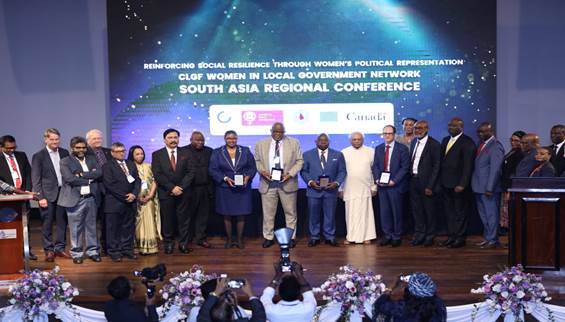
Addressing the CLGF conference, Dr. Chandra Shekhar Kumar requested to host the next CLGF meeting in India, the largest member country of the Commonwealth. This initiative aims to promote and strengthen democratic local governments across the Commonwealth and foster the exchange of best practices.
Dr. Chandra Shekhar Kumar shared insights and views during the session on “International Experience: Cases from the Commonwealth – Economic and Spatial Inclusion.” He highlighted the key role of India’s approximately 2.6 lakh Panchayati Raj Institutions (PRIs) in covering 60% of the population and contributing significantly to the GDP during the CLGF Conference on “Reinforcing Social Resilience through Women’s Political representation” in Colombo, Sri Lanka.
Emphasizing women’s crucial roles in development, Dr. Chandra Shekhar Kumar noted that women constitute 48% of the rural population with a labour force participation rate of 41.5% in 2022–23. The 73rd Constitutional Amendment mandates the devolution of powers to Panchayats, including “Women and Child Development,” to enhance local governance.
Additional Secretary, Dr. Chandra Shekhar Kumar emphasized that India takes pride in being a global leader in gender representation at the grassroots level, with 46% of local body positions held by women in Panchayati Raj Institutions/ Rural Local Bodies, compared to the global average of 36%. He highlighted that significant representation of women in decision-making processes and women-led development is crucial for achieving the United Nations 2030 Agenda for Sustainable Development. The Government of India supports women’s empowerment through various schemes, contributing a substantial amount towards education, health, economic empowerment, digital literacy, leadership skills, and security. As well, the Ministry’s e-Governance initiatives have made Panchayat representatives digitally proficient, with 90% of Gram Panchayats uploading online development plans and financial transactions.
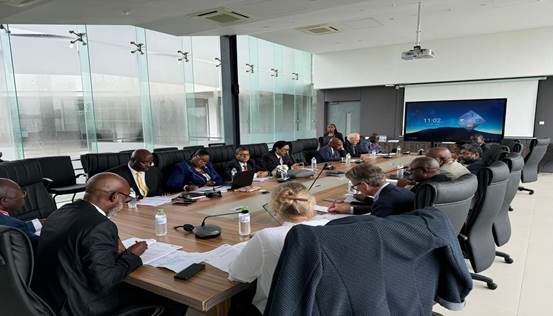
Dr. Kumar also underlined the efforts of Ministry of Panchayati Raj in providing international exposure to Elected Women Representatives (EWRs) and adopting the Localization of SDGs (LSDGs) approach, including the “Women Friendly Panchayat” theme. He highlighted that the Ministry has provided opportunities and exposure for elected women leaders at international forums and events, such as “Localizing the SDGs: Women in Local Governance in India Lead the Way” on 3rd May, 2024, at the United Nations Headquarters in New York, and “Women Leaders as Change-makers: Gender Equality for Good Governance” in October 2019 at the United Nations.
Additional Secretary, Dr. Kumar mentioned that States and UTs, guided by the Ministry of Panchayati Raj, have implemented measures such as reservation for women, participation programs, and training initiatives to enhance women’s roles in local governance. Under the Ministry’s guidance, 23 States and UTs have adopted 50% reservation for women, exceeding the Constitutional provision of 33% reservation in PRIs/ RLBs.
India has emerged as a global leader in gender representation at grassroots levels, with 46% representation in local bodies, surpassing the global average of 36%. Key factors for increased women’s participation in PRIs include constitutional provisions, socio-economic improvements, and government support through various women-oriented schemes. Dr. Kumar also highlighted the Ministry’s initiatives in digital empowerment and international exposure for women leaders, alongside the adoption of Localization of SDGs for women’s empowerment in local governance.
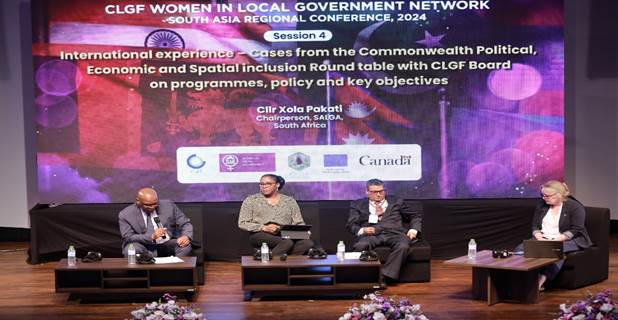
Dr. Chandra Shekhar Kumar discussed with colleagues from Commonwealth Local Government organizations from around the world at CLGF Annual Board Meeting in Colombo, exchanging insights and discussing strategies for enhancing local governance and community resilience. He reiterated India’s commitment to empower women and strengthen rural communities. The CLGF Forum brought together a diverse group of local government participants, including Ministries of Local Government, elected local mayors and leaders, permanent secretaries, officials from all spheres of government, academics and development partners.
Three women Sarpanch from Maharashtra – Smt. Archana Pawar (Kumbhari Gram Panchayat, Yavatmal District), Smt. Sharda Gaydhane (Bela Gram Panchayat, Bhandara District), and Smt. Kavita Ware (Kisal Gram Panchayat, Thane District) – along with Smt. Chandrika Rangani from Gujarat (Kanakpar Gram Panchayat, Kachchh District), also participated in the CLGF Conference in Colombo, Sri Lanka during 25 – 27 June, 2024, which aimed to review and ratify a Charter for Gender Equality for Local Government in South Asia.
The four Sarpanch presented their case studies, best practices and success stories. Training in digital and social media was conducted for Local Self-Government delegates during the ComWLG- Commonwealth Women in Local Government Network South Asia Meeting. This forum provided women with an opportunity to share their experiences as grassroots leaders, discuss challenges faced by women in local government, agree on actionable points to strengthen elected women and women’s rights, and build capacity in specific focus areas for local leaders.
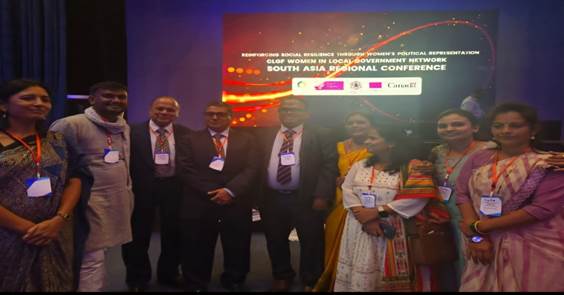
Background of CLGF:
Since its establishment in 1995, the Commonwealth Local Government Forum (CLGF) has actively worked in Asia to support decentralization and reforms that empower local governments, improving governance and service delivery. CLGF is unique as a membership organization that unites Local Government, Ministries of Local Government, national associations of local government, and individual councils from the 56 Commonwealth countries. It also includes research, training, and professional organizations as members.
CLGF’s work focuses on promoting local democracy, sharing experiences and good practices, and capacity building to enhance policymaking, strengthen local government institutions, and improve service delivery and democratic processes at the local level. CLGF is dedicated to supporting women’s full and active participation in public life, especially in achieving equal representation in local governance, aligning with SDG 5: Achieve gender equality and empower all women and girls.









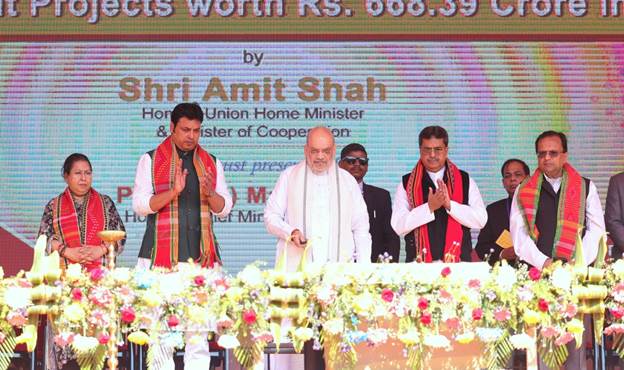


More Stories
IIM Nagpur-Ivey Case Conference 2024 : A Global Platform For Business Management Trends.
Union Home Minister And Minister Of Cooperation, Amit Shah, Inaugurates And Lays The Foundation Stone For Various Development Projects Worth Over ₹668 Crore In Dhalai, Tripura.
India Of Today Is No Longer What It Was About Two Decades Ago : Union Minister Dr. Jitendra Singh.